Fantasia Film Festival Dispatches: ‘Slaxx’, ‘The Curse of Audrey Earnshaw’, ‘Lucky’, ‘Tezuka’s Barbara’, ‘Detention’, ‘Bleed With Me’
Usually, the genre-heavy Fantasia International Film Festival is held annually in Montreal, but with things the way they are this year (terrible), the festival has gone virtual. This year, Chris Evangelista and Matt Donato are covering Fantasia for /Film, firing off dispatches featuring capsule reviews of the titles we’ve watched from the safety of our own homes, all while dreaming of poutine.
In this edition: killer jeans, pioneer horror, blood, and more.
Slaxx Is Dressed To Kill, Starting With Capitalism
Where In Fabric is the seductively artful killer-wardrobe horror story, Slaxx is the creature-feature approach that’s more like a chic slasher. Elza Kephart’s possessed “Super Shapers” pants go on a murder spree inside a Canadian Cotton Clothiers outlet currently under lockdown. With “Monday Madness” the next morning, workers must stay on task without any outside distractions. Unfortunately, a very deadly one awakens in their storage room.
Kephart’s flashier opening drenched in blood and shopper-beware satire starts Slaxx how you’d expect, but the third, more somber act feels at odds with the preceding energy. Newbie Libby (Romane Denis) is introduced to sassy floor managers, corporate suck-ups, and neglectful day-jobbers who are all dispatched by blood-sucking pants. Then the film leans into the sincerity of unlawful labor abuse and other big-business commentaries, and some of that magic vanishes.
Still, Slaxx delivers on early promises (my full review thoughts dive deeper). Zippers slice off appendages, waistlines are hugged too tight, and there’s even a pants-off dance number. Kudos to the effects team for working actual pairs of denim bottoms as props instead of animating the titular “slacks.” It’s a little detail that makes this silly capitalism take-down all the more inviting, as jeans under mannequin bodies roam free with vengeance as a red light special. – 7 out of 10 – Matt Donato
The Curse of Audrey Earnshaw Sees More Tumbleweeds Than Thrills
Pioneer horror has been coming more into popularity since The Witch, with witchcraft folklore and titles such as Hagazussa. Thomas Robert Lee’s The Curse of Audrey Earnshaw is a blend of both, banking on atmosphere and cursed rituals to overcome a low budget. At times it’s a representative period piece of quieter times; in other glimpses, a ho-hum thriller that kicks up dust.
The film tells of Agatha Earnshaw (Catherine Walker), who oversees the only farmland for miles not plagued by misfortune (dead livestock, poison soil), and her thought-to-be-dead daughter, Audrey (Jessica Reynolds). Devout locals cry of the devil’s treachery when using Agatha’s name, and Audrey has had enough. Maybe there’s truth behind the unholy rumors (of course). Maybe there’s a pregnancy incantation involved (yup). It’s all so subdued, but not in the subtle and slow-burn-effective kind of way.
I’d say my mundane reaction is because my interests favor horror-comedies and more riotous midnight fare, but that doesn’t explain personal defenses of movies like the prairie-doggin’ The Wind, Hagazussa, sidequest The Head Hunter, and other more outdated affairs. There’s power in this film’s performances, especially Ms. Reynolds’ reclamation of life, but it’s just a bit too one-note as the “horror” plays itself in expected formats. – 5 out of 10 – Matt Donato
Lucky Is A Fiery, Frustrated Narrative That Extinguishes Itself
One of the most conflicting predicaments any film critic can face is acknowledging a worthwhile message within an otherwise poorly executed product. Writer/star Brea Grant‘s impetus behind Lucky‘s screenplay is ever-fucking-relevant. It’s an experiential gender outcry in ways men can never understand. Women spend every day fighting, trying to survive in a world that ignores their cries for help, with only one another to trust.
That’s the message I believe Lucky wants to promote, but without the execution or narrative recognition to do as much.
Grant plays May, a self-help author who can’t help herself. Upon coming home one night, she spies a masked stalker outside her window. Partner Ted (Dhruv Uday Singh) calmly explains that it’s the man who comes to kill them both every night, as always. Thus begins this Groundhog Day time loop where no one seems to take May’s endangerment seriously, going as far as to label her “lucky.”
The commentary is there. The frustration, and failure, and rage is there. Unfortunately, neither Natasha Kermani‘s direction nor the script’s third-act reinventions do any service to the urgency behind its themes. It’s a film that spirals out of control until it’s lost any sense of thematic identity, where a lack of subtlety is both its early blessing and a closing curse. – 4 out of 10 – Matt Donato
Tezuka’s Barbara is a Weird, Jazzy Story of Writer and Muse
There’s nothing a writer hates to hear more than criticism. Sure, they welcome it, even encourage it in some cases. But the minute you give a writer a bad review, don’t be surprised if they immediately get sulky (trust me, I know from experience).
Yosuke Mikura (Goro Inagaki) is a popular writer. How popular? So popular that people recognize him on the street and practically fawn all over him. Perpetually wearing sunglasses and a well-cut black suit, he stalks around with a constant chip on his shoulder, worried that his writing is so popular because it’s trashy, since trashy seems to be what the public loves.
Things come to a head when he meets the constantly drunk mystery girl Barbara (Fumi Nikaido), who isn’t afraid to laugh at some of his hokier scribblings. At first blush, it seems like the writer is going to take advantage of Barbara, especially when he brings the stumbling drunk girl back to his cool apartment. But it becomes quickly apparent that Barbara has the upper hand here, setting off a weird journey full of strange sex scenes (ever wanted to see a guy get seduced by a department store dummy?) and even stranger outbursts.
Full of cool-as-ice jazzy music and overflowing with style, Tezuka’s Barabara is a treat to spend time with, although it takes far too long for the film to settle into its grove and get to where it wants to go. Still, you won’t mind (most of) the journey. – 7 out of 10 – Chris Evangelista
Detention is a Haunting Blend of History and Horror That Recalls Pan’s Labyrinth
From the late 1940s through the late 1980s, Taiwan was under martial law, in a period known as the White Terror. We enter into this world via Detention, John Hsu’s gorgeous and horrific tale based on the video game of the same name.
Recalling both Pan’s Labyrinth and Silent Hill, Detention unfolds in an almost fairytale manner, with the horrors of the real world being blended with the strange and supernatural. It’s 1962, and at the Tsuihua Secondary School, a group of students attend a Dead Poets Society-style group where they secretly pour over banned books and other paraphernalia. This is a dangerous thing to do, and sure enough, it leads to problems.
Late one night, students Wei (Jing-Hua Tseng) and Fang (Gingle Wang) both find themselves mysteriously still in their school long after it’s closed – and nothing seems right. Strange and horrifying visions abound, along with malevolent forces roaming about looking to punish “traitors.”
Full of lush-yet-nightmarish imagery, Detention suffers a bit from plodding pacing and a few overdramatic beats (the title card sequence alone seems designed to scream in your face). But the blend of history and horror goes a long way towards making Detention a unique saga. – 7 out of 10 – Chris Evangelista
Detention: Alternate Take
Once again, I’ll scream from the mountaintops that video game adaptations are best when based on horror properties. John Hsu’s Detention is another example in favor of my point, placing viewers in 1962 Taiwan during the White Terror martial law period. Times are dire, as exposed by sanctioned death penalties just for possessing banned literary works.
Fang (Gingle Wang) and Wei (Jing-Hua Tseng) find themselves trapped in Greenwood High School, where Wei once participated in a banned book club. They regain consciousness in a purgatorial realm filled with militant slender-guards empowered to execute any “rebels” who dare read leftist rhetoric, forced to relive Wei’s club’s disbanding through government persecution. It’s as much a period piece as it is a retelling of oppression, with a dash of hope thrown in about how we must survive to see the walls of tyranny fall.
Oh, it’s also spooky-as-ever, thanks to plenty of dramatized killings and faceless ghoulies roaming nightmarish hallways.
Whenever critics reference Asian horror, it’s usually Japanese or Korean. Taiwanese horror isn’t all that different, as we’re reminded of countless atmospheric ghost stories that explore their narrative with equal attention paid to scripted development and scares. The word “complete” comes to mind, in the way we’re thrown into a nightmare that still speaks against fascism. It’s a history lesson taken to heart as the egotism of leaders hasn’t changed much in fifty-plus years. – 7 out of 10 – Matt Donato
Bleed With Me is a Chilling Subversion of Cabin in the Woods Horror
If there’s one thing we’ve learned from horror movies it’s to never, ever go to a cabin in the woods. Such a getaway can only spell disaster. Unfortunately, the characters of Bleed With Me didn’t get the memo.
The painfully awkward Rowan (Lee Marshall) heads up to a cabin with her best friend Emily (Lauren Beatty) and Emily’s boyfriend Brendan (Aris Tyros). Almost immediately, Rowan feels like a third wheel – a feeling that’s only exacerbated when she overhears Brendan complaining to Emily about Rowan spoiling their “time alone.”
But as the time in the cabin wears on, a dynamic shifts. Rowan and Brendan actually start to hit it off, and Emily begins acting weird. And if that weren’t enough, Rowan keeps waking up with bleeding cut marks on her arm. Is she cutting herself? Is someone else injuring her? And what is with the weird, sudden visions Rowan has where she catches Emily chowing down on raw, bloody meat?
It’s all so perfectly spooky, and writer-director Amelia Moses does a fantastic job of letting her film worm its way under your skin. Bathed in hazy, dreamy light and giving off a distinctly chilly (and chilling) vibe, Bleed With Me builds and builds, pulling you along with it, unable to put up much of a fight. It’s definitely the best movie I’ve seen as part of Fantasia this year. – Chris Evangelista – 8 out of 10
The post Fantasia Film Festival Dispatches: ‘Slaxx’, ‘The Curse of Audrey Earnshaw’, ‘Lucky’, ‘Tezuka’s Barbara’, ‘Detention’, ‘Bleed With Me’ appeared first on /Film.
from /Film https://ift.tt/2QvUfuG
via IFTTT
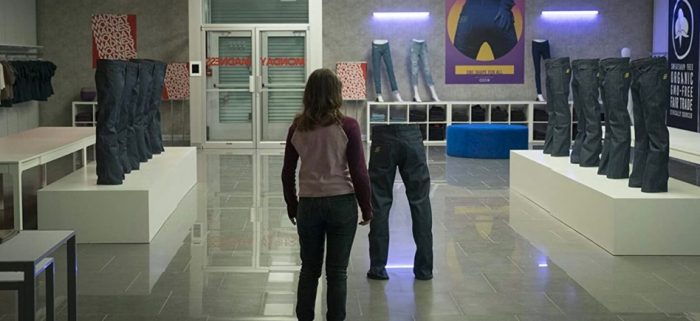
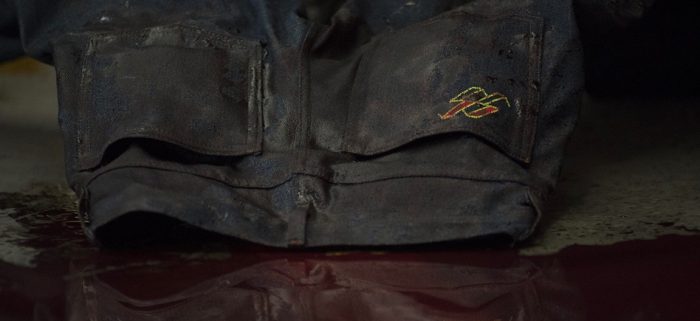
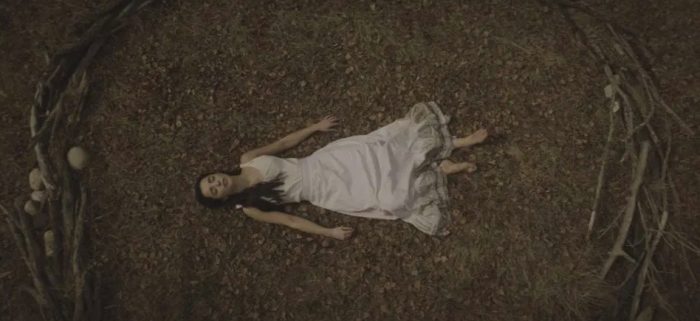
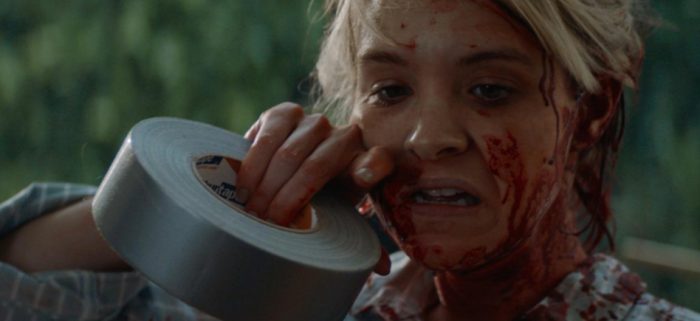

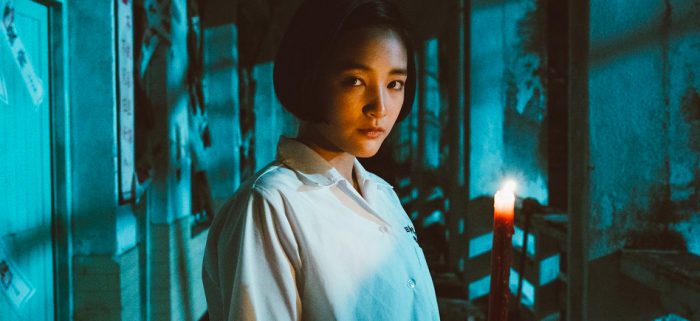
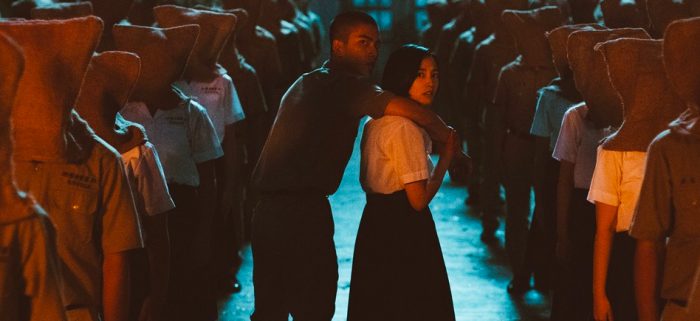
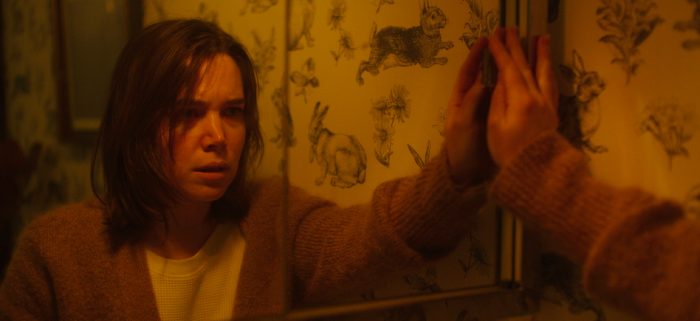
Comments
Post a Comment